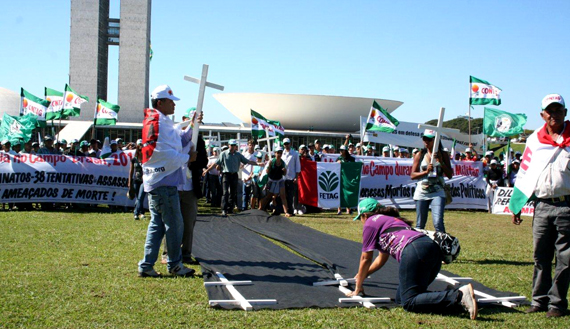|
Grito da
Terra is the largest annual mobilization organized by the National Confederation
of Agricultural Workers of Brazil (CONTAG). This year’s edition brought almost
7,500 workers to Brasilia. Some delegations, like that of the state of Rondonia,
traveled 48 hours by bus to reach the capital. Seventy percent of the food
consumed in Brazil is grown in family farms, but politicians and the government
in Brasilia appear to be unaware of this reality. Could it be that they’re
eating imported food products?
A sea of people flowed down the
Esplanada dos Ministérios avenue to the National Congress and the seat of the
Federal Government demanding a comprehensive land reform, decent work for the
rural laborers, agro-chemical-free food production, justice and an end to rural
violence, and sustainable and socially inclusive rural development.
At the mobilization’s main rally,
organizers described the current state of rural Brazil, home to 29 million
people, of which 52 percent are men and 47.9 percent women, and 53 percent are
under the age of 30.
Of the 16 million people who live
in abject poverty in Brazil, 9 million are in rural areas, and 5 million of
these are in the northeast.
Rural workers earn less than a third of what urban workers make. Over half of
all rural wage earners lack social security coverage.
Only an estimated 8.7 million
homes have access to clean water, and almost a third of the rural population
live in houses that do not have indoor plumbing.
The situation of education is also alarming and it is further proof of the state
of neglect that Brazil’s rural communities are in. Around 23 percent of Brazil’s
rural men and women over the age of 15 are illiterate, and 23 percent of them
report that they have not received any education whatsoever or have attended
less than one year of school. To make matters worse, over the last three years
some 300 schools have been closed down. To address this situation, CONTAG
is campaigning for the development of a National Rural Education Policy,
to be implemented in coordination with state authorities and municipalities and
with the active involvement of civil society.
The struggle for
land
And
the violence of a socially-exclusive
and authoritarian model
In denouncing this situation,
CONTAG president Alberto Broch highlighted that “The concentration of
land ownership and the agro-export model are responsible for the high rates of
poverty and inequality, which prevent millions of rural and urban people from
enjoying a decent life.”
| |
|
|
| |
Around 23 percent of Brazil’s rural men and women over the age of 15
are illiterate, and 23 percent of them report that they have not
received any education whatsoever or have attended less than one
year of school |
|
| |
|
|
“We need to bring the country’s
process of agrarian reform out of its current state of paralysis, with more than
200 settlements alongside highways. We have to put a stop to the violence from
the large landed estates, and demand public policies that successfully address
the situation of rural Brazil once and for all,”
Broch said.
Brazil
has the second highest level of land concentration in the world, surpassed only
by Paraguay: 48 percent of the country’s lands are in the hands of 2
percent of all landowners, while family-owned farms account for 84 percent of
landowners, but occupy just 25 percent of the surface area.
Historically, unscrupulous
landholding practices have led to an outrageous concentration of political power
and generated widespread social conflicts.
According to CONTAG vice
president Alessandra da Costa Lunas, “Large landed estates and violence
are two sides of the same coin. We came out of a brutal military dictatorship 27
years ago, and it has taken us almost three decades to establish a Truth
Commission to investigate what happened to our disappeared and murdered
leaders during those darks years.”
| |
|
|
| |
In 2011 alone, 29 union and environmental leaders were killed in
rural Brazil, another 38 suffered attempts on their lives, and 347
death threats were reported. This has to stop |
|
| |
|
|
“There were 832 rural leaders
and activists murdered or disappeared during the dictatorship. But, sadly, we
are still fighting against that same rural violence and our people are still
being slaughtered for demanding agrarian reform and our human right to land.
In 2011 alone, 29 union and environmental leaders were killed in rural Brazil,
another 38 suffered attempts on their lives, and 347 death threats were
reported. This needs to stop,” Costa Lunas said.
CONTAG
marched to Brasilia to demand a Brazil without large landholdings and an
agrarian reform that will democratize land ownership as a way of guaranteeing
the rights of peoples and communities.
Emphasis was also made on the Solidarity Economy as another form of organizing
work in the countryside, based on solidarity, sustainability, and cooperation.
 |